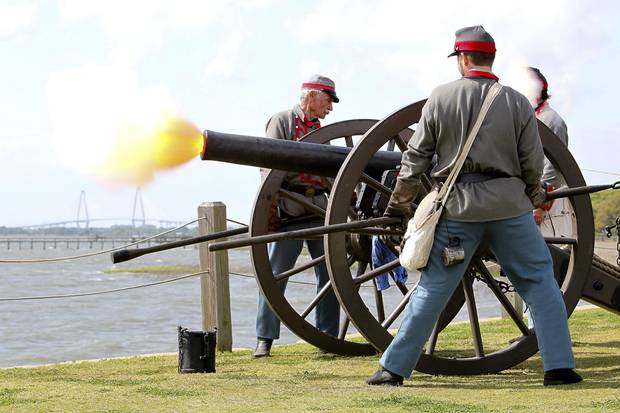What Trump said
U.S. President Donald Trump suggested in an interview with The Washington Examiner that he was unclear about the origins of the Civil War, that President Andrew Jackson (who died 16 years before the war) could have prevented the conflict and that it was possible to have settled it without bloodshed:
Could that one not have been worked out?
Mr. Trump later doubled down on that opinion in a tweet:
President Andrew Jackson, who died 16 years before the Civil War started, saw it coming and was angry. Would never have let it happen!
— Donald J. Trump (@realDonaldTrump) May 2, 2017
Why did the Civil War start?
The issues leading up to the Civil War were complex, and many people in the North and South in 1861 viewed the conflict as inevitable.
In the South, slave labour was the foundation of an economy based on the cotton produced by plantations and farms. The free labour also was key to profiting from the production of such cash crops as tobacco, corn and other staples of the South. In the North, farms were generally smaller because of the soil and climate. With their more industrialized economy, the Northern states didn't require large numbers of slaves.
By the 1850s, the North vs. South divide was widening as free states and slave states debated over allowing slavery in new territories as the nation expanded westward. Southerners viewed the North's opposition to slavery's expansion as a threat to the economies – and thus the political power and rights – of slave-holding states. Abraham Lincoln, opposed to slavery's expansion, was elected president in 1860 and the path to the South's seceding from the Union was set.
Eric Foner, professor of history at Columbia University, explains that slavery was the catalyst for war:
Slavery was the root cause of the Civil War. It was not the only cause, but it was the underlying cause. There was a fundamental difference between the North and the South as the South feared for the future of slavery.

Re-enactors fire mortars at the Pitt Street Bridge in Charleston, S.C., near Fort Sumter – where the first shots of the Civil War were fired – on April 12, 2011, the battle’s 150th anniversary.
ALICE KEENEY/ASSOCIATED PRESS
Could it have been avoided?
Probably not, according to James Roark, an author and retired history professor at Emory University in Atlanta:
As it got tangled with American politics and regional interests, nobody could figure out a way to save both the Union and preserve slavery in the South It wasn’t for a lack of talking. There was plenty of talking.

Members of the media and Jimmy Carter Presidential Library and Museum staff walk past a bust of Andrew Jackson, left, as they tour the exhibit on Feb. 13, 2003.
RIC FELD/ASSOCIATED PRESS
What would Andrew Jackson have done if he lived that long?
Probably not much, Prof. Foner says:
Even Andrew Jackson, were he alive, could not have threatened the use of force that perhaps Trump thinks would have solved the problem.
Harold Holzer, a New York-based scholar who is an expert on the Civil War and Abraham Lincoln, says Mr. Jackson – a slave-holding plantation owner who died in 1845 – wasn't the missing ingredient that could have prevented war:
The Civil War was caused by slavery; it wasn’t caused by the absence of Andrew Jackson to help the American government.
How was the war resolved?
After four years and more than 600,000 soldiers dead, Confederate Gen. Robert E. Lee surrendered on April 9, 1865, at the village of Appomattox Court House in Virginia.

Confederate general Robert E. Lee, right, is shown surrendering his army to Union general Ulysses S. Grant in this 1867 painting by Richmond artist Louis Guillaume.
COURTESY OF APPOMATTOX COURTHOUSE NATIONAL PARK/ASSOCIATED PRESS
MORE FROM THE GLOBE AND MAIL

